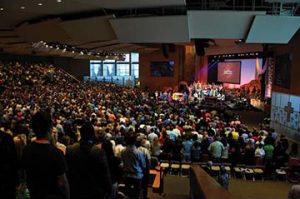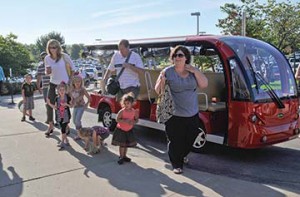
The CE Interview: Chief Operation Officer | Lutheran Church of Hope | West Des Moines, IA
By Rez Gopez-Sindac
From hotel management to church leadership, 41-year-old Chris Gunnare proves that when it comes to running a successful operation, never underestimate the power of customer care.
In 2005, and at the peak of his career as a hotel developer, Gunnare decided to serve full-time at Lutheran Church of Hope — bringing with him a passionate perspective on five-star service.
Although Gunnare’s first visit at Hope in 2000 was less than spectacular — the line was long; the parking lot was full; he and his family watched the service on a small TV from an overflow room — he says that by the end of the service, he knew they had found a church home.
And like many church leaders who made the leap of faith from the corporate world to full-time ministry, Gunnare took a significant pay cut — about 300 percent. He says, “It’s a good thing I had been listening in church and realized that money wasn’t the most important thing!”
How did your background and training in the hospitality industry prepare you for your current role at Hope?
My work experience was based on service and guest experience. One of my roles at Hope is to make sure we do everything we can to make the guest experience as positive as possible.
RELATED RESOURCES
- John Mark Comer: A Voice for the Emerging Generation
- Gunnar Johnson: Stewardship Evangelist
- Charles Jenkins: transformational leader
 Also, growing up, my parents taught me to work hard, help others — especially the less fortunate — and always strive to finish strong. These skills have been invaluable to me in doing the hard work of ministry. I’ve never worked harder in my life, but I’ve also never been so excited to go to work. There’s nothing better than ministry on the front lines, because we get the chance to see God change people’s lives.
Also, growing up, my parents taught me to work hard, help others — especially the less fortunate — and always strive to finish strong. These skills have been invaluable to me in doing the hard work of ministry. I’ve never worked harder in my life, but I’ve also never been so excited to go to work. There’s nothing better than ministry on the front lines, because we get the chance to see God change people’s lives.
Over the last six years, I’ve had the privilege of mentoring 20 different guys who’ve made the transition from successful business leaders in the secular world, to the role of executive pastor. I pray this opportunity will shorten their learning curve and provide them a resource when they feel alone or confused. For those churches considering adding an executive pastor, I can tell you that I’ve seen it bless many churches. These leaders come with a wealth of knowledge and experience that isn’t taught in seminary. Combine that with a love for Christ and a passion and desire to serve their church, and good things are bound to happen!
As a former hotel executive, you know what excellent customer service looks like. Was it difficult to get Hope on board with the concept of a five-star service?
Actually, it was pretty easy. One of the first things my senior pastor shared with me was some studies about how the first 10 minutes has the most impact on whether a guest will return to your church a second (third or fourth) time. Ironically, I knew this from the restaurant and hotel industry — and was shocked that it holds true in ministry as well (though now it makes perfect sense, as both the church and the restaurant industry are after the same “customer”). Studies also prove that as people come back to your church, the likelihood they will later become associated with your church also increases. The reason for wanting them to come back isn’t for growth or to increase our attendance numbers; it’s so they can have the opportunity to experience the love and salvation that’s found through the Gospel.
What’s the impact of good customer care on Hope?

We have an amazing worship team and talented preachers who work together to create an excellent worship experience. But, it’s the warm hospitality that most people mention first
when asked why they decided to worship at Hope. Our hospitality team really strives to exceed the expectations of our guests.
However, hospitality can’t just be from those serving as greeters, ushers or the parking team. It should come from the entire congregation. We ask all those who serve to be “secret greeters” on their off weekend, when they’re not serving. So at any given service, we have about 150 people (who aren’t wearing nametags) looking around the parking lot, lobby, atrium, fellowship hall and Worship Center for people who are new or have questions. They reach out to these folks, welcome them to Hope and start a conversation with them that usually leads to a question or the beginning of a friendship. Regardless, it goes a long way in making the guest feel welcome.
What are some of the practical ways Hope wows its guests?
First impressions are important, so every detail matters. Landscaping, condition of parking lot and signage are just a few of the things many churches overlook.
Once the guests arrive, it all starts in the parking lot. Each car arriving is met with a friendly smile from a parking volunteer. For those who parked a little farther away or in one of our overflow lots, we have electric shuttles that bring guests from their cars to the church’s front door, with a friendly greeting and warm welcome from the volunteer driver. For those passing up on the shuttle ride and choosing to walk, there’s a positive buzz and excitement as they walk in the lot to the building. It’s amazing to watch people connect as they walk in together. As they get to the front door, they’re met with smiles and handshakes from our greeters. The greeters welcome the guests and offer assistance to those looking for some information. We’ve found over the years that many will pass this first layer of help, but then when they get about 10 to 15 feet into the building, they stop and stare, like, “Now, where do I go?”
But, because we have secret greeters, we’re able to provide another level of support as these greeters have time to walk them where they need to go. This level of service is what I hear most often from new members and guests when they explain their first experiences with Hope. We also have greeters in the Worship Center who welcome our guests and help them find a seat. After the service, we make sure we thank our guests for coming and we stay around to help answer their questions and get them connected. Then, as they leave, the shuttle is waiting at the front door to take them back to their car.
What advice might you want to give to hard-working executive pastors out there?
1) Have some trusted people within your church (staff or church member) who can speak truth to you. People who know you well enough to just grab you by the collar and say, “Go home” or “When was the last time you took a day off?” Those type of questions.
2) Have people you can talk to about the stress of ministry outside of the church. I have a number of people I can reach out to when I’m struggling with something —many of them in similar roles at other churches. It’s wise to pick up the phone and have honest conversations with trusted people outside your church community who know what you’re going through and are willing to just listen and be there for you.
3) Your staff isn’t perfect, and your pastor isn’t perfect, either. This may shock you because you came to work at a church — but even though they’re great people, they’re still human! The great thing is, you can all serve alongside one another for the greater good … together!
4) Before you joined the staff, the church was a place of solitude for you. When you start working for the church, you may find it’s now hard to worship there, because you might feel like you’re never off duty. You could lose that place of solitude and feel like working for the church took that place away.
How do you see Lutheran Church of Hope growing even more in the future?

We understand that Hope’s past growth and future growth depends on our ability to rely on the Holy Spirit to help guide us to do the things we’re called to do. We’ll continue to network with other churches, nonprofits and for-profit organizations that provide five-star (or even six-star) service. There’s no such thing as status quo. We’re either working to improve, or we’re falling behind.
Our goal as a church has never been to reach “X” number of people, but instead to reach all. Therefore, until everyone knows and accepts that Jesus Christ is their Lord and Savior, we still have work to do — and we have to find unique and crazy ways to reach them!
My 3 toughest demands
As COO of a megachurch, Chris Gunnare knows a thing or two about tackling operational challenges.
What are your three toughest operational challenges as COO of a megachurch?
1) Ensuring that our resources (financial, staff, facility and volunteers) are properly aligned with the mission, vision and values of the church. This is especially hard when we have to make hard decisions to reduce certain areas of ministry so we can start a new one or add to others.
2) Developing a staff culture that allows us to maximize our impact on our community as well as the world around us.
3) Keeping the best interest of those we’re trying to reach, versus pleasing those who are already with us. Many churches get comfortable with what they’re doing, because it pleases those who are already there. But, if we’re called to reach out, then we have to look at our community and see who is not being reached by the Gospel. In the secular world, if we lose a customer, we could find others to help us reach our goal. In ministry, every person we miss (or don’t reach), the consequence could be eternal.
That’s a heavy price for failure!
How do you deal with these challenges?
1) Submit to the Lord in prayer and study His word. Ask boldly for His wisdom, support and protection.
2) Balance. You’ll never get everything done, no matter how many hours you work. While this is an area where I still rely on friends to hold me accountable, we’re so much better for our church and our ministry when we take time to breathe, be with family and friends, and get away.
3) Surround myself with smart people. At Hope I’m blessed to work for a great senior leadership team. I also have a great team of ministry leaders, both paid and unpaid, that fights the good fight and makes a difference on this side of heaven.
4) Prioritize my schedule based on what will bring the biggest return. This can be tricky, though, because oftentimes, spending time in an area that isn’t broken can result in better return on time and talent than working on an area or project that isn’t clicking on all cylinders.
5) Determine what metrics are important, and monitor them often. Evaluate changes (both good and bad) to see if we can identify the reason for the change. Catching this early gives us the opportunity to make adjustments as needed.
6) Open and consistent communication with our senior leadership team, the ministry leaders, the entire staff, volunteer leaders, volunteers and the congregation. We’ve found that open and honest communication is the best way to build trust and respect. Also, it helps prevent people from making wrong assumptions about why we’re doing some things, but not doing others.
7) Full transparency of all things financial. I also serve as the chief financial officer. It’s a huge honor and responsibility to help allocate how to best spend the offering dollars of our congregation.
We take great pride in ensuring we maximize every dollar we spend, and that every expense is necessary. People trust us to use their money to expand God’s kingdom.
QUICK FACTS
Lutheran Church of Hope
Year established: 1993
Denomination: ELCA
Number of full-time staff: 42
Yearly budget: $12.5 million
Number of locations: 4, plus an online campus
Combined weekly attendance: 10,049


